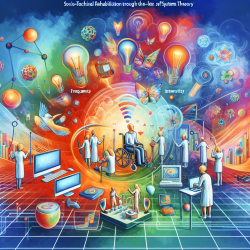Unlocking the Power of Situational Awareness in Therapy
In the realm of speech-language pathology and therapy, understanding how practitioners can improve their skills is crucial for creating better outcomes for children. A recent study titled Experience-Dependent Effects to Situational Awareness in Police Officers: An Eye Tracking Study provides intriguing insights that can be applied to therapy settings. This study, conducted by Huhta et al., examines how police officers' situational awareness (SA) is enhanced through experience, focusing on eye-tracking data to understand gaze and fixation patterns.
Understanding Situational Awareness
Situational awareness is a critical skill, not just for police officers but also for therapists. It involves the perception, comprehension, and projection of information in a given environment, which informs decision-making and actions. In therapy, situational awareness can help practitioners better understand and respond to the needs of their clients.
Key Findings from the Study
- Experienced officers fixated earlier on critical areas such as hands, spending less time scanning the environment compared to novices.
- All participants fixated longer on targets compared to the periphery, indicating the importance of focusing on key areas for effective situational awareness.
- The study highlights the potential for using eye-tracking data to inform training and improve situational awareness.
Applying Insights to Therapy
While the study focuses on police officers, the insights can be translated into therapy settings. For therapists, especially those working with children, understanding where to focus attention can significantly enhance the therapeutic process. By adopting a similar approach to situational awareness, therapists can:
- Improve their ability to perceive and respond to subtle cues from clients.
- Enhance decision-making processes by focusing on critical information.
- Develop more effective strategies for engaging with clients and addressing their needs.
Encouraging Further Research
The study by Huhta et al. serves as a foundation for further research into how situational awareness can be enhanced in therapy settings. By exploring the use of eye-tracking technology and other objective measures, researchers can develop evidence-based training programs that improve outcomes for children in therapy.
Conclusion
Incorporating situational awareness into therapy practices can lead to more effective interventions and better outcomes for children. By learning from the insights gained in other fields, such as policing, therapists can enhance their skills and provide more targeted support to their clients.
To read the original research paper, please follow this link: Experience-Dependent Effects to Situational Awareness in Police Officers: An Eye Tracking Study.










